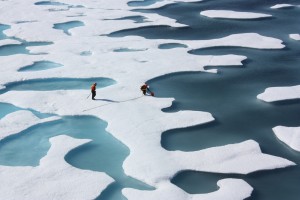PAOC Spotlights
Oceans in a Warming World: 3 Questions with John Marshall
How do oceans affect climate, and vice versa? EAPS Professor of Oceanography John Marshall answers those questions and more in his talk Oceans in a Warming World.
***
 John Marshall, the Cecil and Ida Green Professor of Oceanography in MIT’s Department of Earth, Atmospheric and Planetary Sciences, recently spoke with the MIT Club of Northern California about the role oceans play in global climate change. The world’s oceans are at the center of many contemporary climate issues, such as temperature and sea level rise, melting sea ice, acidification and changing marine environments. Marshall's talk, Oceans in a Warming World, explores these questions and more, as well as current and future impacts. Oceans at MIT asked Marshall about the dynamic relationship between oceans and climate change and what we can expect in the future.
John Marshall, the Cecil and Ida Green Professor of Oceanography in MIT’s Department of Earth, Atmospheric and Planetary Sciences, recently spoke with the MIT Club of Northern California about the role oceans play in global climate change. The world’s oceans are at the center of many contemporary climate issues, such as temperature and sea level rise, melting sea ice, acidification and changing marine environments. Marshall's talk, Oceans in a Warming World, explores these questions and more, as well as current and future impacts. Oceans at MIT asked Marshall about the dynamic relationship between oceans and climate change and what we can expect in the future.
1. How has our understanding of the relationship between oceans and climate changed over the last few decades?
It’s long been known that the ocean plays a central role in setting the mean climate of the earth, but in the last few decades the scientific community has also come to realize that, due to its huge heat capacity and ability to move heat around the globe as well as take heat in to its interior, the ocean plays an enormous role in transient climate change. As mankind puts greenhouse gases (GHG) in to the atmosphere, the planet is warming up. However, the rate of surface warming and the global patterns of warming is controlled to a large extent by the ocean because it sets the effective heat capacity of the climate system.
There have also been great technological advances in the last decade enabling us to map how the ocean’s interior temperature warms on a global scale. We can see in much more detail what's going on thanks to these global systems. In particular the ‘Argo array’ — thousands of autonomous floats profiling the top 2 km of the ocean – give us fascinating insights into and a quantification of the efficiency by which the ocean absorbs heat. Moreover, the anthropogenic warming signal that we’re looking for is much larger now than it was 50 years ago, when mankind’s impact on climate was much less.
It’s worrying that things are changing so fast and that the warming signal is growing, but the ocean is a crucial part of this story. It’s absorbing heat and at the same time having a cooling effect on the surface. If the oceans weren't there, we'd be warming much faster than we are, which I don't think many people realize. As oceans carry heat around the globe, it shapes the patterns of response. For example, the Arctic is warming more than the Antarctic, which we think is largely due to ocean circulation. So the oceans are critical to the large-scale patterns of warming.
2. What are some implications of this emerging understanding of the ocean in transient climate change?
There are many important implications and I draw attention to a few key ones here.
The Arctic
 I think it’s likely that as the globe warms, the polar regions of the Northern Hemisphere (NH) will warm more than the Polar Regions around Antarctica. There are at least two reasons for this. One is that there is more land in the NH, whereas the Southern Hemisphere is almost all ocean. Given that the heat capacity of land is smaller than the ocean, it warms more rapidly simply because it has less capacity to take up heat. The other reason is that there’s a big difference in land and ice coverage between the poles. The Arctic is an open ocean and only covered (at least for now) by a thin sheet of ice, whereas Antarctica is land capped with several kilometers of glacier. For these reasons I believe the Arctic is much more vulnerable in a warming world than the Antarctic.
I think it’s likely that as the globe warms, the polar regions of the Northern Hemisphere (NH) will warm more than the Polar Regions around Antarctica. There are at least two reasons for this. One is that there is more land in the NH, whereas the Southern Hemisphere is almost all ocean. Given that the heat capacity of land is smaller than the ocean, it warms more rapidly simply because it has less capacity to take up heat. The other reason is that there’s a big difference in land and ice coverage between the poles. The Arctic is an open ocean and only covered (at least for now) by a thin sheet of ice, whereas Antarctica is land capped with several kilometers of glacier. For these reasons I believe the Arctic is much more vulnerable in a warming world than the Antarctic.
Observations in the last 20 to 30 years show that waters around Antarctica aren’t warming up as fast as waters around the Arctic. Basic oceanographic principles suggest that this asymmetry reflects the impact of the global ocean ‘conveyer belt’, with sinking in the northern North Atlantic and upwelling around Antarctica. In the Antarctic, cold water upwells from below and that continually quenches the global warming signal. But in the North Atlantic, warm waters are carried in the Arctic and there’s no upwelling of cold waters. We might be moving move into a world where there is no summertime ice in the Arctic, or it is severely diminished.
All this has huge geopolitical and resource implications. People will look toward the Arctic for resources, and the Northwest Passage will likely open up allowing shipping to pass between the Atlantic to the Pacific more easily. Oil, gas, and mineral exploration will also increase in the Arctic, which has all kinds of environmental implications. I don’t think mankind will be able to resist tapping into these newly available natural resources. I recently learned that oil companies are not allowed to explore below 60 degrees South, but there’s no such regulation in the Arctic. Climate change in the Arctic could create geopolitical tensions, because the ownership of the Arctic isn’t clear.
Sea-Level Rise
It's inevitable that in a warming world, sea-level will rise because warm water expands, all else being equal. We’ve got a good handle on how much it will rise—approximately 10 to 20 centimeters per century—based solely on heating rates. But the patterns of sea-level change will not be uniform. They depend on ocean temperature change patterns, with the ocean circulation playing a key role in setting those patterns.
The big uncertainty—and I don’t think anybody really knows the answer because it’s very hard to quantify—is how much sea level will rise due to land ice melting and flowing into the oceans. The physics of this are extraordinarily complicated, not well observed or understood, and therefore not well-incorporated in to our models. If big chunks of Greenland or the West Antarctic Ice Sheet break off into the oceans sea level could rise many meters. But the uncertainties on that are very large.
Ocean Life
 I know about the physics and circulation of the ocean, but I’m not very knowledgeable about life in the ocean. However, I would be remiss not to mention another big problem facing the ocean: That of ocean acidification.
I know about the physics and circulation of the ocean, but I’m not very knowledgeable about life in the ocean. However, I would be remiss not to mention another big problem facing the ocean: That of ocean acidification.
The ocean is not only warming up, but because atmospheric carbon dioxide dissolves into the oceans and makes it more acidic, its chemistry is also changing. Increasing acidity will make it more difficult for certain species to survive as easily as they do now. The ocean is full of organisms—creatures large and small—which use dissolved carbonate and calcium ions found in seawater to construct their shells and skeletons. Most famous are corals, which build reefs of calcium carbonate that are some of the greatest hotspots of biodiversity in the ocean. But there are many other creatures whose environment will be adversely affected—marine snails, shellfish, crustaceans such as shrimp and lobsters, starfish, sea urchins and their kin, even some species of single-celled amoebae and photosynthetic algae. Many of these organisms serve fundamental roles in marine ecosystems, either as food for larger organisms or in the biochemical processes that shape oceanic environments and the climate. Habitats for marine life will likely shift and that life will in turn respond and evolve in response. I don’t think we’ll necessarily lose inventory, but habitats and life will evolve in ways that are hard to predict.
3. What is the main message you want people to take away?
I am a scientist who has thought about ocean circulation for my entire career, but I have only focused my research on climate change quite recently. I’m somewhat new to this, but I’ve been looking and thinking about what’s going on. It is clear to me that the ocean is warming up and that this is caused by man’s activities. We have to accept the data and look with a clear eye into likely future consequences and try to ameliorate them as best we can.
The main message I would like people to take away is that the oceans not only record what is happening as the climate changes, but are also an active player in that change. That the oceans has been warming in the latter half of the 20th century tells us that the warming originates from the atmosphere, almost certainly a consequence of rising atmospheric GHGs.
Finally, I should say that there are also other man-made things going on in the ocean which don’t have to do with global warming—things like over-fishing, pollution, debris in the ocean, and so on. Basically, there are so many of us on the planet that we are now affecting huge systems like the ocean which we once thought were so large they couldn’t, or wouldn’t change. But they are.
For more Oceans in a Warming World, watch Marshall's talk here.